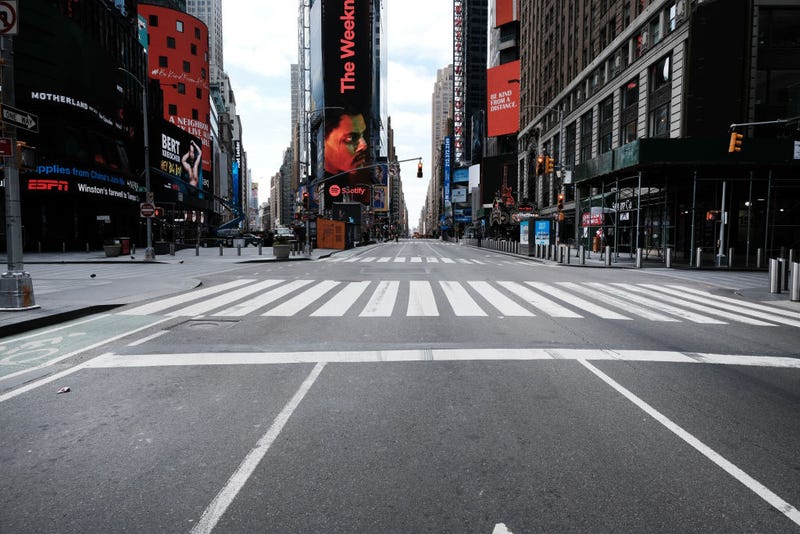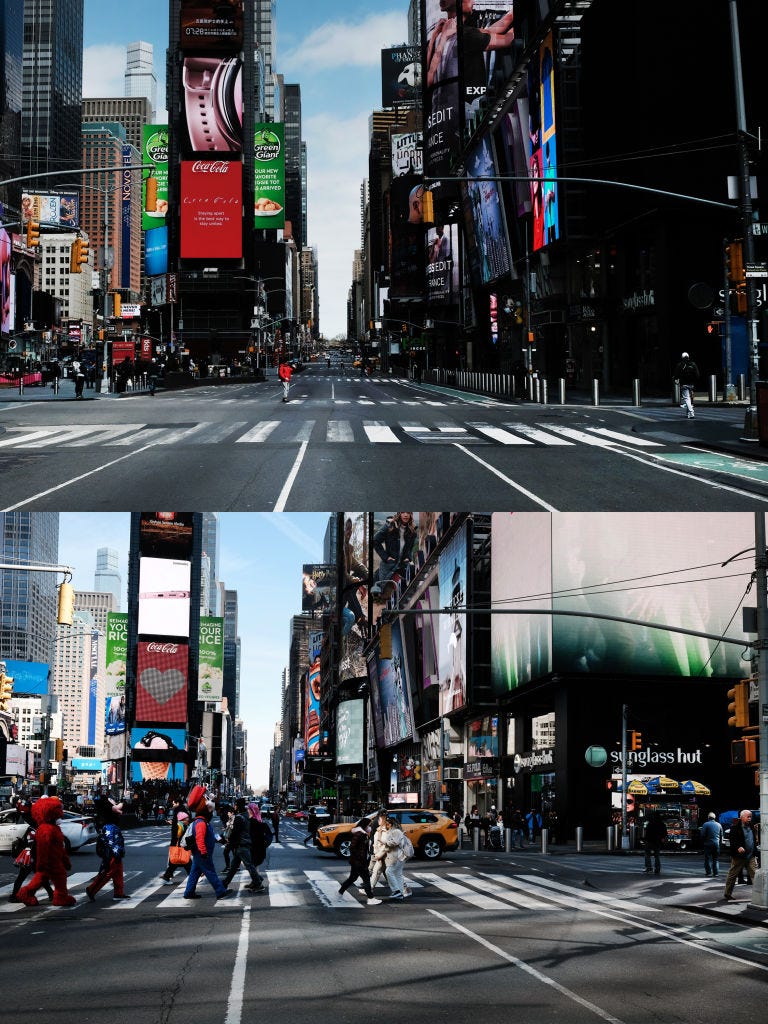
Think back to the week the world stood still.
From the moment the World Health Organization declared the coronavirus outbreak a global pandemic on March 11, 2020, life as we knew it would never be the same.
We picked up a whole new vocabulary as "quarantine," "social distancing" and "contact tracing" became part of our new normal. Our everyday behaviors changed: we obsessively sanitized our hands, isolated, and even wiped down our groceries -- that is, if you could find any. People were sent into such a panic that they started hoarding everything from toilet paper and bottled water to rice and pasta sauce, leaving store shelves bare across America.
Since we couldn't gather in person, we went to virtual concerts, held work meetings on Zoom, celebrated drive-by birthdays, visited loved ones through windows and learned how to do basically everything online. While some of us ordered an absurd amount of takeout, others sharpened their at-home cooking skills. We learned about sourdough starter in the kitchen and the devastating effect of protein spikes in our bodies.
Thinking back through the pandemic, certain moments were so shocking or remarkable that they stand out like a beacon in a sea of darkness.
Stay-at-home orders
The pandemic became real for many of us when states started implementing restrictions that ordered us to stay home unless absolutely necessary. Some of us even drove around with papers that stated we were essential employees and allowed to be out of our homes.
California was the first to enact a statewide mandatory stay-at-home order on March 19, 2020. Over the next three weeks, 42 other states issued similar orders. Only seven states -- Arkansas, Iowa, Nebraska, North Dakota, South Dakota, Utah, and Wyoming -- did not have stay-at-home orders.
The orders varied from state to state and some were more restrictive than others. Some ordered the temporary closure of nonessential businesses, including restaurants, theaters, salons, gyms, retail stores and churches. Others prevented gatherings in groups of more than 10 people, including for funerals. Offices shut down, forcing employees to work virtually where possible. In situations where it wasn't, workers were laid off or furloughed.
The White House deferred to states when it came to restrictions, but it did recommended that social distancing guidelines be followed and that all schools be closed with classes held virtually. It also suggested that people avoid gathering in groups, and eating and drinking at bars and restaurants.
Major cities turned into ghost towns
With most of America under stay-at-home orders, cities across the country became virtually deserted -- as if the apocalypse was upon us. Streets and freeways were void of traffic, and pedestrians were an uncommon sight.

New York's Time Square looked like it was standing still without the constant stream of taxis and people.
YouTube was flooded with drone videos that showed bustling cities -- Chicago, Boston, Los Angeles, Detroit, Houston, Nashville, New Orleans -- completely empty.
Tom Hanks gets infected
While millions of people across the country would become infected with the virus, Tom Hanks was the first well-known public figure to catch COVID. On the same day the pandemic was declared, Hanks announced that he and his wife Rita Wilson tested positive. No one knew what was going to happen, but if America's everyman could catch it, it seemed like none of us were safe.
In a Twitter post, Hanks explained that they both fell ill while in Australia. Both were hospitalized for three days even though they were suffering different symptoms.
"We felt a bit tired, like we had colds, and some body aches. Rita had some chills that came and went. Slight fevers too," he said.
Hanks later said Wilson had a high fever and lost her sense of taste and smell, while he had crippling body aches, was very fatigued and couldn't concentrate on anything for more than a few minutes.
Both eventually recovered.
Bodies start piling up
So many people died from the virus in the first few months that morgues and hospitals had no place to store all the bodies. As facilities became overwhelmed with dying patients, reports started circulating of human remains being piled up in rooms.
Refrigerated semi trailers, so-called mobile morgues, started popping up in major cities to preserve dead bodies when medical facilities were at capacity. The bodies had to be stored and couldn't be cremated or buried right away because testing for the virus and determining a cause of death took several days.
Trump goes off the cuff at COVID press briefings
Former President Donald Trump made his first comment on the coronavirus on January 22, according to Vox, telling CNBC: "We have it totally under control. It's one person coming in from China, and we have it under control. It's — going to be just fine." Over the next several months, he repeated claims that COVID-19 was "under control" and that the pandemic was "fading away." The former president drew such criticism with his comments during press briefings -- during which he frequently touted misinformation and falsehoods, according to ABC News -- that the White House temporarily stopped holding the daily events.
Here's a sample of some of Trump's most controversial comments during the early days of the coronavirus outbreak:
At a campaign rally in New Hampshire on Feb. 10, 2020, Trump said: "Looks like by April, you know, in theory, when it gets a little warmer, it miraculously goes away. I hope that's true." That same day, during an event with governors at the White House, Trump doubled down: "During the month of April, the heat, generally speaking, kills this kind of virus. So that would be a good thing," he said.
During a photo op at the White House on Feb. 27, 2020, Trump proclaimed that COVID-19 would just disappear. "We have done an incredible job. We’re going to continue. It’s going to disappear," he said. "One day — it's like a miracle — it will disappear. And from our shores, we — you know, it could get worse before it gets better. It could maybe go away. We'll see what happens. Nobody really knows."
On March 20, 2020, the former president was touting anti-malaria drug hydroxychloroquine as a possible treatment for the virus, calling it "one of the biggest game changers in the history of medicine" even though there was no scientific evidence to back up his claims.
"Look, it may work and it may not work," he said during White House briefing. "I feel good about it. That's all it is. Just a feeling. You know, I'm a smart guy. I feel good about it."
The former president on March 24, 2020 said he was hoping to lift coronavirus restrictions by Easter, adding that he would like to see the country "back to work" and "all of the churches full." He told Fox News: "I would love to have the country, opened up and just raring to go by Easter."
In perhaps one of his most shocking moments from the pandemic, on April 23, 2020, Trump suggested that doctors should study UV radiation and injecting disinfectant directly into the body as ways of fighting COVID.
"So, supposing we hit the body with a tremendous — whether it's ultraviolet or just very powerful light — and I think you said that that hasn't been checked, but you're going to test it. And then I said, supposing you brought the light inside the body, which you can do either through the skin or in some other way, and I think you said you're going to test that, too," he said. "And then I see the disinfectant, where it knocks it out in a minute. One minute. And is there a way we can do something like that, by injection inside or almost a cleaning? Because you see it gets in the lungs, and it does a tremendous number on the lungs. So it would be interesting to check that.”
On May 19, 2020, Trump called America's 1.5 million cases a "badge of honor." At the time, the U.S. had the highest number of infections in the world.
"When we have a lot of cases, I don't look at that as a bad thing, I look at that as, in a certain respect, as being a good thing... because it means our testing is much better. I view it as a badge of honor, really, it's a badge of honor," he said.
Most of America meets Dr. Anthony Fauci for the first time
Dr. Anthony Fauci has been the director of the National Institute of Allergy and Infectious Diseases since 1984. But it wasn't until the pandemic hit that he became a household name. The nation's top infectious disease expert gave countless statements about ways to stop the spread and keep each other safe. It seemed like he was on our TVs every day, giving updates on the current case counts and what the government was doing in response.
One of his most notable moments also launched him into viral meme status. On March, 20, 2020, the normally stoic Fauci couldn't hide his reaction to Trump's comments during a during a coronavirus press briefing after the commander in chief used the term "Deep State Department." One simple motion of covering his forehead was all it took to turn the doctor into a meme known as the "Fauci Faceplant."
Sporting world at a standstill
As the world came to a grinding halt, sporting events were not spared. The NBA was the first league to suspend its season, making the call on the same day the pandemic was declared. The announcement came after players started testing positive and team owners were leaning toward playing games without fans in arenas.
The next day, the NCAA canceled its March Madness tournaments for both men and women. The move came after several teams announced they would not be participating amid safety concerns. The organization was initially hoping to carry on without fans present but ultimately made the decision to cancel the tournaments outright.
The NHL paused its season with 189 games remaining. Play resumed over the summer in two "hub" cities, Edmonton and Toronto, with players remaining "in the bubble" to prevent any infections.
The MLB suspended spring training and delayed the regular season, eventually opting to condense its typical 162-game schedule down to just 60 games.
The NFL was the only professional league that did not cancel a single game in response to the pandemic. The league established protocols that allowed the 2020 season to go on uninterrupted, albeit without fans in the stands.
Never before had the Olympic Games been postponed or canceled for something other than war. But on March 24, 2020, organizers of the Toyko summer games decided to postpone the Olympics for a year.
In other sporting events, the 2020 Masters Tournament and multiple PGA championships were postponed, and the Boston Marathon was also delayed,
Vaccine gets emergency authorization
In what many people saw as the first glimmer of light at the end of the tunnel, the FDA issued the first emergency use authorization for a vaccine to prevent COVID-19 on December 11, 2020 -- nine months to the day that the pandemic began. The authorization allowed the Pfizer-BioNTech COVID-19 vaccine to be distributed in the U.S. for individuals 16 and older. A week later, the Moderna COVID-19 vaccine was also authorized for those 18 years and older.
Dr. Anthony Fauci called it a "historic, unprecedented achievement," noting that vaccines typically take 10 to 15 years to develop. The vaccine was made possible due to the government's "Operation Warp Speed," which provided billions of dollars in funding to accelerate the process.






